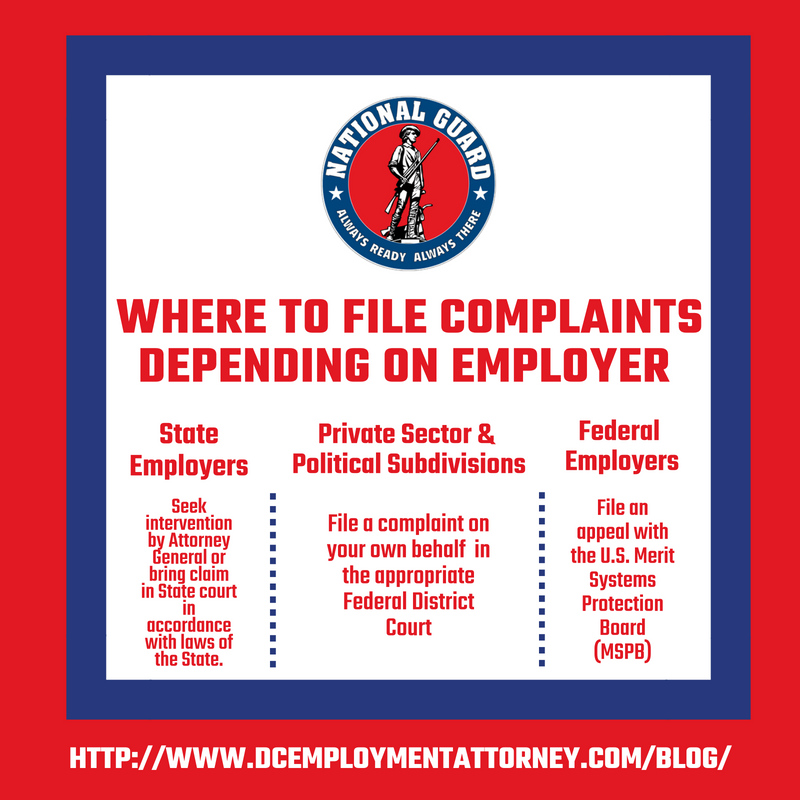
This is the last of three posts regarding employment protections afforded to service members under The Uniformed Services Employment and Reemployment Rights Act of 1994, 38 U.S.C. § 4301, et seq. (“USERRA”).
While USERRA applies to nearly all employers, how you go about enforcing your rights under USERRA depends a great deal on the type of employer.
First, before filing a lawsuit, everyone has a right to request administrative investigation of the alleged USERRA violation by contacting the Department of Labor Veterans’ Employment and Training Service (DOL-VETS). This is not a requirement but can be helpful. Because USERRA does not contain a statute of limitations, it is often useful to proceed with the administrative investigation and review of the case before proceeding with a lawsuit.
DOL-VETS will attempt to investigate your complaint, including contacting your employer, and if they determine your complaint has merit they will attempt to resolve the complaint by ensuring the employer’s compliance with USERRA. However, if they cannot resolve the complaint, or if they do not believe it has merit, they will inform you of their findings and conclusions and notify you of your right to proceed with the complaint in one of two ways.
If your complaint is against a State or private sector employer, you will be notified of your right to have the complaint referred to the Attorney General (Department of Justice (DOJ)) for review to determine if DOJ believes the complaint has merit and whether they will elect to appear on your behalf by filing a lawsuit in federal court. If your complaint is against the Federal Government, you’ll have the right to refer the case to the Office of Special Counsel who will make a similar determination as DOJ does for state and private sector employees except that OSC would file an appeal before the U.S. Merit Systems Protection Board (MSPB) instead of in federal court. If the government chooses not to proceed with your case on your behalf, you’ll receive notice that they are declining to appear on your behalf and you’ll then have the option to file a complaint on your own behalf in either federal court or before the MSPB.
The important thing to remember here is that while you don’t need to contact DOL-VETS to investigate, or refer the case to DOJ or OSC after the investigation, if you do then you’ll need to wait until DOL-VETS completes their investigation (90 days) and/or DOJ/OSC declines to take the case (60 days) before you can proceed with a lawsuit on your own.
Whether you file a lawsuit after availing yourself of DOL-VETS and DOJ/OSC, or file a lawsuit without going through that process, where you file the complaint will depend on what type of employer you have.
First, for State employers, you’ll likely need DOJ to appear on your behalf and file a lawsuit in the name of the United States against the State in federal court. Federal Courts have held that States are protected from suit under USERRA by a private individual based upon the 11th Amendment’s sovereign immunity protections. This substantially limits your ability to protect your USERRA rights against State employers. However, you may also be able to file a complaint in State court pursuant to the State’s laws, but many states either prohibit claims under USERRA based on sovereign immunity and/or do not contain similar state laws providing the same protections. Each state is different though and it is important to consult with an attorney before making a decision on whether you can proceed with an action against a State employer.
Second, for private sector employers and political subdivisions of states (Cities, Counties, etc.), you can file a complaint on your own behalf in the appropriate Federal District Court.
Finally, for employees of the federal government (excluding the Judicial Branch), you have the right to file an appeal with the U.S. Merit Systems Protection Board (MSPB). The MSPB is an administrative body with Administrative Judges who hear appeals related to certain federal personnel matters, including USERRA complaints. If you are not satisfied with the Administrative Judge’s initial decision, you may appeal it to the full Board, which is a three-member panel appointed by the President. If you are unsatisfied with the Board’s final decision, you may file an appeal with the U.S. Court of Appeals for the Federal Circuit. There is no deadline to file a complaint but if you have previously filed a complaint with DOL-VETS, you are still required to complete that process before filing with the MSPB.
If a federal court, state court (for states that allow claims) or the MSPB find that your employer has violated USERRA, they will order your employer to comply with the law and award you damages for lost wages and benefits. For State and private employers, but not the federal government, the Court can also award liquidated damages in the same amount as the lost wages and benefits awarded if they find that the violation of your rights under USERRA was willful.
In all instances, if you proceed with a complaint without the assistance of DOJ or OSC, you are entitled to obtain an attorney to represent you in the case and to be awarded reasonable attorney fees if you prevail. The exception to this is that attorney fees are not recoverable before the U.S. Court of Appeals for the Federal Circuit under USERRA, which would be the second level of review from an MSPB initial decision for a federal employee. Lastly, USERRA does not permit costs to be charged to USERRA claimants, so you won’t be required to pay any filing fees to file your case.
The legal process for protecting your rights under USERRA can be complicated but there is no statute of limitations and court costs may be waived. If you believe your rights have been violated, contact an attorney to discuss what options you have. Thank you for your service.